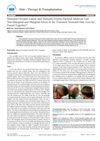 22 citations,
June 2004 in “Journal of The European Academy of Dermatology and Venereology”
22 citations,
June 2004 in “Journal of The European Academy of Dermatology and Venereology” A woman had both Graham Little-Piccardi-Lassueur syndrome, causing hair loss, and complete androgen insensitivity syndrome, making her genetically male but physically female. This suggests androgens don't affect the hair loss condition.
[object Object]  February 2023 in “Global journal of health sciences and research”
February 2023 in “Global journal of health sciences and research” Zinc levels are not significantly linked to the presence or severity of alopecia areata.
1 citations,
December 2023 in “Biomolecules” Regulating cell death in hair follicles can help prevent hair loss and promote hair growth.

Trichosol™ with Minoxidil can boost hair growth by 20%.
June 2021 in “European journal of medical and health sciences” PRP therapy is a safe and effective treatment for hair loss.
2 citations,
August 2022 in “Frontiers in Immunology” Microneedling with betamethasone led to almost complete hair regrowth in severe alopecia areata.
 2 citations,
January 2013 in “Hair therapy & transplantation”
2 citations,
January 2013 in “Hair therapy & transplantation” Hair transplants can be a treatment for scarring hair loss if there's good blood flow and no active disease.
 January 2024 in “Dermatology Review”
January 2024 in “Dermatology Review” Current treatments for androgenetic alopecia are limited, but research is ongoing to find better solutions.
[object Object]  28 citations,
January 2014 in “Indian Journal of Dermatology, Venereology and Leprology”
28 citations,
January 2014 in “Indian Journal of Dermatology, Venereology and Leprology” Chinese patients with primary cicatricial alopecia often have folliculitis decalvans, benefit from treatment, but may experience relapse, with dermoscopy being a useful diagnostic tool.
 24 citations,
January 2021 in “Dermatologic Therapy”
24 citations,
January 2021 in “Dermatologic Therapy” Platelet-rich plasma (PRP) is a safe and potentially effective way to treat hair loss, especially when combined with minoxidil.
 4 citations,
April 2022 in “Dermatologic Therapy”
4 citations,
April 2022 in “Dermatologic Therapy” Injecting scalp tissue micrografts is a safe and effective treatment for hair loss after COVID-19.
 14 citations,
September 2016 in “Journal of Cutaneous Pathology”
14 citations,
September 2016 in “Journal of Cutaneous Pathology” The document concludes that new methods improve the accuracy of diagnosing scalp alopecia and challenges the old way of classifying it.
 2 citations,
January 2021 in “Przegląd Dermatologiczny (1959)”
2 citations,
January 2021 in “Przegląd Dermatologiczny (1959)” The article discusses various treatments for different types of non-scarring hair loss.
January 2022 in “Clinical Cases in Dermatology” A 22-year-old man has alopecia areata, an autoimmune hair loss condition, with various treatments available.
 March 2021 in “CRC Press eBooks”
March 2021 in “CRC Press eBooks” Hair loss without scarring is more common than permanent hair loss with scarring, and is often due to genetic factors.
 1 citations,
May 2022 in “Frontiers in Psychiatry”
1 citations,
May 2022 in “Frontiers in Psychiatry” Hair loss was the first sign of a brain-related complication in a woman with lupus, and early treatment helped her hair grow back.
 1 citations,
February 2014 in “Hair therapy & transplantation”
1 citations,
February 2014 in “Hair therapy & transplantation” A baby boy had two types of temporary hair loss at birth, which might be two forms of newborn hair loss combined.

A patient with patchy hair loss was successfully treated for Tumid Lupus Erythematosus after other treatments failed.
5 citations,
September 2021 in “Clinical case reports” GLPLS is a rare skin condition with specific hair loss and skin symptoms.
 1 citations,
November 2017 in “Skin appendage disorders”
1 citations,
November 2017 in “Skin appendage disorders” Ingrown hairs are a common feature in scarring alopecias due to follicular damage.
 56 citations,
March 2010 in “Journal of Dermatology”
56 citations,
March 2010 in “Journal of Dermatology” Most cases of Temporal Triangular Alopecia are found in early childhood and may be related to genetic conditions.
 4 citations,
December 2017 in “American Journal of Dermatopathology”
4 citations,
December 2017 in “American Journal of Dermatopathology” Naked hair shafts are significantly associated with scarring hair loss and may help diagnose it, especially when multiple are found.
 56 citations,
July 2005 in “Journal of The American Academy of Dermatology”
56 citations,
July 2005 in “Journal of The American Academy of Dermatology” Using both vertical and transverse sections gives a better diagnosis of alopecia than using one method alone.
 1 citations,
April 2020 in “International Journal of Research in Dermatology”
1 citations,
April 2020 in “International Journal of Research in Dermatology” Trichoscopy is a reliable method for diagnosing different types of hair loss.
4 citations,
December 2021 in “Dermatologic Therapy” Mesotherapy for hair loss can cause temporary forehead swelling.
 February 2020 in “Scholars international journal of traditional and complementary medicine”
February 2020 in “Scholars international journal of traditional and complementary medicine” Ayurveda treats hair problems like hair loss and dandruff by balancing body elements and using natural remedies like Indian Gooseberry and false Daisy.
 2 citations,
August 2021 in “Journal of pharmaceutical research international”
2 citations,
August 2021 in “Journal of pharmaceutical research international” Fenugreek seed extract in a nanoparticle gel could be a promising new treatment for hair loss.
 January 2024 in “Journal of Education, Health and Sport”
January 2024 in “Journal of Education, Health and Sport” Platelet-rich plasma therapy shows promise in treating hair loss caused by androgenic alopecia.
 July 2021 in “Open access journal of biomedical science”
July 2021 in “Open access journal of biomedical science” A lotion with natural extracts significantly sped up hair growth in women with hair loss from chemotherapy.
 July 2024 in “Clinical Cosmetic and Investigational Dermatology”
July 2024 in “Clinical Cosmetic and Investigational Dermatology” Exosomes can help promote hair growth and may treat hair loss.























